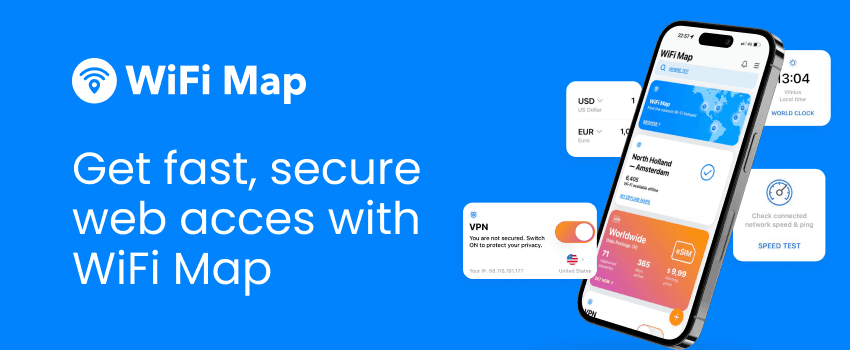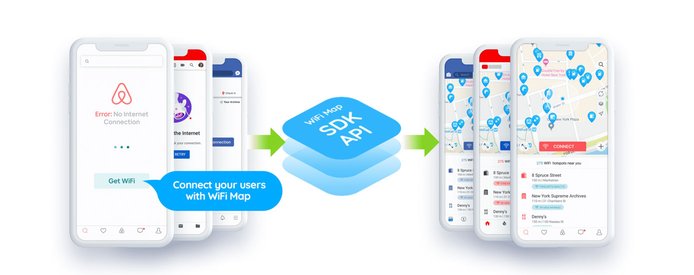To all posts

WiFi Map is helping individuals access the web, businesses better serve customers, and developers connect end users to the internet
Posted: August 5, 2020
TL; DR: WiFi Map is a simple yet powerful application that provides users with the names, speeds, locations, and passwords of the nearest free wifi connections across the globe. The free, crowdsourced tool allows users to give back by adding new wifi hotspots, thus helping others gain access to free wifi. WiFi Map is also developer-friendly, featuring software development kits (SDKs) and application programming interfaces (APIs) designed to ensure a seamless integration process.
It would have been hard to believe a decade ago, but access to wifi has become somewhat of an essential need — especially in countries where people depend on mobile devices as their primary gateway to the internet.
After all, access to the internet provides fundamental rights in terms of freedom of expression, serves as a vast information resource, and, as we’ve seen with the recent pandemic, it can keep individuals connected to their jobs and education.
But while most of us can’t fathom life without the services the internet brings, a reliable connection is far from a given.
“Over the course of the past 10 years or so, phones have become very affordable, but in many areas of the world, internet costs have remained high and inaccessible,” said Denis Sklyarov, Founder and CEO of WiFi Map. “It’s similar to sitting in your Bentley but not being able to go anywhere because you can’t afford gas.”

WiFi Map aims to get such smartphone owners up to speed with its free, crowdsourced internet connectivity tool. The real-time application leverages its database of more than 100 million hotspots in 200 countries to direct users to the nearest hotspots. The app includes information on the name, speed, and location of each connection — and even provides passwords when applicable.
In addition to individual users, the app can help businesses and developers leverage wifi mapping to their advantage. A local coffee shop, for instance, can add its information to the WiFi Map database to attract more customers.
Developers, on the other hand, benefit from the ability to integrate WiFi Map’s capabilities into their own products using the app’s software development kits (SDKs) and application programming interfaces (APIs).
Access Wifi Networks Worldwide via One Simple App
WiFi Map, based in New York, was launched in 2014 by Denis and Co-Founders Dzmitry Plashchynski, Igor Goldenberg, and Kirill Kudin. The application started on iOS under a freemium model where users could download the software at no cost and access additional features via a paid upgrade.
“We were building apps, and we saw an opportunity in the space,” Denis told us. “Back then, there was no in-app purchase (IAP) model to monetize apps, so our approach was to build a free version of the app and direct users who needed more functionality to the paid version.”

The company struck digital gold soon after running a marketing campaign intended to draw in customers through free access to the app for 48 hours. The media caught wind of the promotion, and in a matter of a few days, WiFi Map was downloaded more than 1 million times.
“That was the first major indication that we were onto something big,” Denis said. “For the past eight years or so, we’ve been actively promoting the crowdsourcing aspect within our application to provide people access to free and accessible wifi worldwide.”
Today, the app is available for free on both iOS and Android, with the option to upgrade to WiFi Map PRO for offline maps and an ad-free experience. The free version includes a rich feature set, including map navigation, wifi speed tests, network scans to identify intruders, smart search functionality, and the ability to share free wifi locations on Facebook, Instagram, and Twitter.
Ensure Connectivity with eSIM Data Plans and a Secure VPN
Denis told us that WiFi Map isn’t just for users that don’t have internet access — it also helps those that do have wifi plans save money on data and roaming charges.
“Without any hyperbole, this is the most useful app I’ve downloaded since Evernote,” said user KevinBG59 in a five-star review on the App Store. “It works flawlessly, has an extensive database, and has made a big difference for me while working mobile. It has saved me at least $75 in data charges (probably more) just in the past two weeks.”
WiFi Map also makes sure that users are secure while they save money. Though the app didn’t include a virtual private network (VPN) on its initial release, the feature was added later. Denis said a VPN is a natural fit for a product that regularly introduces users to new wifi connections.
The team behind WiFi Map introduced a built-in VPN in both its free and paid downloads to prevent internet censorship while ensuring no party can monitor or access user data. “Not only will we guide you to wifi, but we’ll offer you a VPN to make sure it’s a secure connection,” Denis said.
To further ensure streamlined connectivity, the WiFi Map team recently added embedded SIM (eSIM) functionality to the application. These digital SIM solutions allow users to activate a carrier’s cellular plan without a physical card.
“You can buy eSIM data plans for your iPhone 11, 11 Pro, 11 Pro Max, XS, XS Max, and XR,” Denis said. “We’ve essentially become a small internet data provider, allowing users to enjoy connectivity worldwide without switching SIM cards.”
Introducing Developer-Friendly SDK and API Solutions
So far, WiFi Map has proven to be a hit with the B2C crowd. But that doesn’t mean the app isn’t packed with features suitable for the B2B market, such as SDKs and APIs designed to ensure a seamless integration process.
“We’ve developed an SDK that allows other applications to utilize our data,” Denis said. “Our vision is straightforward: If you’re on the Uber app, for example, and you don’t have internet, you simply cannot order a taxi. With WhatsApp and Viber, you can’t make a call if there’s no internet. Instead of an app notifying a user that there’s no internet nearby, our SDK says, ‘Hey, there’s wifi in the Starbucks around the corner.’”

The team also focuses on helping businesses attract customers via the value-add of free internet connectivity. This service comes at no cost, because WiFi Map’s ultimate goal is to become the most extensive resource for wifi hotspots on the planet.“We welcome small and medium-sized businesses to add their information to our database, whether manually or by contacting us,” Denis said. “Our objective is to add as much information about reliable, accessible wifi as possible. These users are listed as verified wifi locations.”
WiFi Map’s algorithms put each wifi connection through a searchable scoring system based on various parameters. Users can sort connections in their area by ratings, which are typically on a scale of one star (the lowest score) to five stars (the highest).
Up Next: Additional Map-Based Resources for Travelers
WiFi Map is already a go-to resource for jet setters, so moving forward, Denis said the goal is to add additional layers of helpful travel information to the map.
“We are working on a product world that will encompass all things travel, including information on restroom locations, places to rent a power bank for your phone, currency conversion locations, urgent care facilities, and so on,” he said.
The product is due to hit the market later this year.
“There are more than 3 million apps out there, but the industry is moving toward a multifunctionality model,” Denis said. “Eventually, we want to become the number one travel app in the world.”
![]()
Questions or Comments? Ask Christine!
Ask a question and Christine will respond to you. We strive to provide the best advice on the net and we are here to help you in any way we can.


